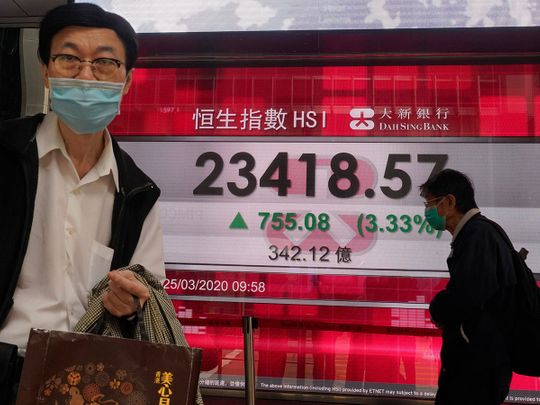
Tokyo: Asian shares extended their rally on Wednesday in the wake of Wall Street’s massive rebound as the U.S. Congress appeared closer to passing a $2 trillion stimulus package to mitigate the economic blow from the coronavirus pandemic.
MSCI’s broadest index of Asia-Pacific shares outside Japan rose 1.7% with Australian shares jumping 3.4% and South Korean shares gaining 3.5%. Japan’s Nikkei surged 4.8%.
“Japanese shares have been bolstered by aggressive buying from the Bank of Japan and pension money this week. That has prompted hedge funds to cover their short positions,” said Norihiro Fujito, chief investment strategist at Mitsubishi UFJ Morgan Stanley Securities.
On Tuesday, MSCI’s gauge of stocks across the globe rallied 8.39%, the largest single-day gain since the wild swings seen during the height of the global financial crisis in October 2008. It rose another 0.8% in Asia on Wednesday.
On Wall Street, the Dow Jones Industrial Average soared 11.37%, its biggest one-day percentage gain since 1933.
Yet, much of the large gains in stock markets pale in comparison with the brutal selloff of the past few weeks as investors braced for a deep global recession in the wake of sweeping lockdowns in many countries.
U.S. S&P500 is still down almost 28% from its record peak hit just over a month ago. Wall Street futures were down 1.1% in early Asian trade.
“Many analysts have recently put out dire economic forecasts, like annualised rate of 20% fall in U.S. GDP next quarter. Europe and Japan should also see double-digit contractions,” said Nobuhiko Kuramochi, chief strategist at Mizuho Securities.
“I suspect the outlooks have sunk in among market players already and that the bear market has run about 80% of its course for now.” Senior Democrats and Republicans in the divided U.S.
$2 trillion stimululs
Congress said on Tuesday they were close to a deal on a $2 trillion stimulus package to limit the economic damage from coronavirus pandemic. But it was unclear when they would be ready to vote on a bill.
Investor fears about a sharp economic downturn appear to be easing somewhat after the U.S. Federal Reserve’s offer of unlimited bond-buying and programmes to buy corporate debt.
“Companies will see their revenues sink and indebted firms will have trouble securing cash, so governments are making the right responses,” said Akira Takei, senior fund manager at Asset Management One.
“The question is, while those responses are necessary in the near term, what if this continues? You can’t keep helping companies that continue to make losses. The longer this drags on, the more likely we will need to adjust to a new normal.” The biggest uncertainty is on how countries can slow the pandemic and how quickly they can lift various curbs on economic activity.
U.S. President Donald Trump pressed his case for a re-opening of the U.S. economy by mid-April.
Rise in US infections
But that met immediate scepticism given the rise of infections in the United States is now among the highest in the world, with the total cases reaching more than 50,000, doubling in less than 3 days recently.
In particular, its financial hub of New York City suffered another quick and brutal rise in the number of infections to around 15,000, raising worries about shortage of hospital beds.
In the currency market, the dollar has slipped as a greenback liquidity crunch loosened slightly.
The euro traded at $1.0808 up 0.15% after four straight days of gains.
The dollar dropped 0.3% against the yen to 110.85 , off a one-month high of 111.715 touched the previous day.
Gold ticked up 0.3% to $1,614.5 per ounce after having soared almost 5%, its biggest gains since 2008, on Tuesday. It was in part helped by concerns lockdowns in major producer South Africa could disrupt supply.
U.S. crude touched a high of $25.10 a barrel early in the session and was at $24.61 a barrel, up 60 cents, or 2.5%, by 1243 GMT.
Brent crude was trading up 49 cents, or 1.8%, at $27.64 a barrel.
The U.S. Congress may vote on Wednesday on the $2 trillion stimulus package which boosted stock markets on Tuesday.
Still, demand for oil products, especially jet fuel, is falling worldwide as more governments announce nationwide lockdowns to curb the spread of the coronavirus, putting a lid on oil price gains.
"It will be difficult to lift demand if lockdowns are announced in many countries and airline services remain suspended," ANZ analysts said in a note.
"Threats of increasing supplies by OPEC and Russia are other downside risks for the market," they added, after the Organization of the Petroleum Exporting Countries and Russia failed to extend an agreement to cut production and support prices beyond end-March.
US crude oil stockpiles likely built for a ninth successive week, while inventories of refined products were expected to have dropped last week with gasoline set to decline for the eighth straight week, a Reuters poll showed on Tuesday.
The American Petroleum Institute (API) is scheduled to release its data for the latest week at 4:30 p.m. EDT (2030 GMT) on Tuesday, and the weekly report from the Energy Information Administration (EIA) is due at 10:30 a.m. on Wednesday.








